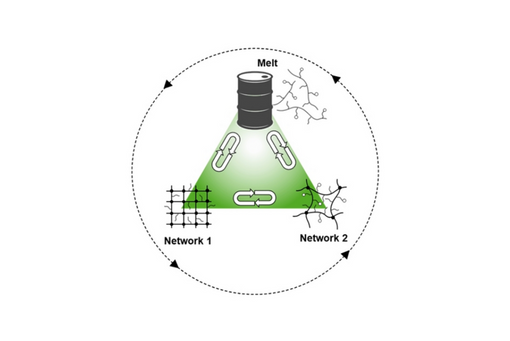Circular Upcycling of Bottlebrush Thermosets
Abstract
The inability to re-process thermosets hinders their utility and sustainability. An ideal material should combine closed-loop recycling and upcycling capabilities. This trait is realized in polydimethylsiloxane bottlebrush networks using thermoreversible Diels–Alder cycloadditions to enable both reversible disassembly into a polymer melt and on-demand reconfiguration to an elastomer of either lower or higher stiffness. The crosslink density was tuned by loading the functionalized networks with a controlled fraction of dormant crosslinkers and crosslinker scavengers, such as furan-capped bis-maleimide and anthracene, respectively. The resulting modulus variations precisely followed the stoichiometry of activated furan and maleimide moieties, demonstrating the lack of side reactions during reprocessing. The presented circularity concept is independent from the backbone or side chain chemistry, making it potentially applicable to a wide range of brush-like polymers.
Citation
Zhang, D., Vashahi, F., Dashtimoghadam, E., Hu, X., Wang, C. J., Garcia, J., Bystrova, A. V., Vatankhah‐Varnoosfaderani, M., Leibfarth, F. A., & Sheiko, S. S. (2023). Circular upcycling of bottlebrush thermosets. Angewandte Chemie, 135(8). https://doi.org/10.1002/ange.202217941


